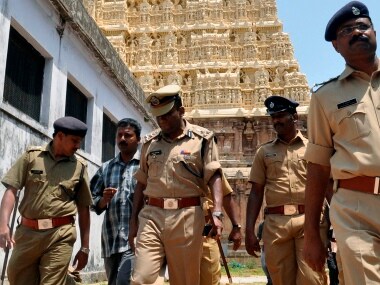The recent furore over political killings in Kerala makes it incumbent that one looks at the issue at a macro level. Kerala, since May 2016, has been ruled by a Left coalition, consisting of primarily CPM and CPI.
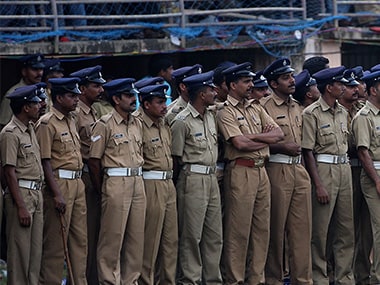
Representational image. Getty Images
Under the scheme of the Indian Constitution, ‘law and order’ is a state subject. This effectively means that the state government is responsible for maintaining law and order in the state and thereby is the custodian of peace.
National Crime Records Bureau (NCRB) is an agency which annually releases statistical data on crime in India. In light of the violence in Kerala, it is incumbent that we look at the statistical data provided by NCRB to provide certain insights on the issue.
NCRB, in its data for the year 2016, categorised the crime of murder as per the motives also. One of categorical motives in the data is “political reasons”, these can be referred as political murders.
As is shown in Table 1, the three states topping the list in terms of gross number of political murders are Uttar Pradesh, Bihar and Kerala, with figures 29, 26 and 15 respectively. The states which are missing in the table recorded no cases of political murders.
Table 1

It is also relevant to have a look at the total number of murders happening in the states and union territories, so as to contextualise the figures for political murders. As is shown in Table 2, Uttar Pradesh and Bihar top the chart of total number of murders also. Kerala, on the other hand, accounted for just 305 murders in total. This places Kerala at a very good level, in the bottom rung of the charts being sixth from the bottom. In the chart, states having fewer than 100 cases of murder have been excluded.
Table 2
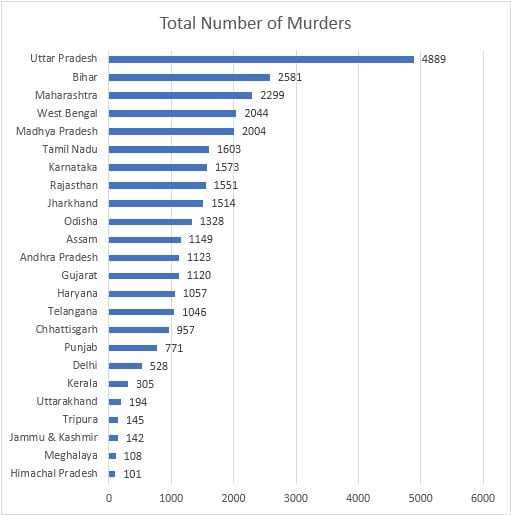
This is an indicator that the law and order machinery is functioning quite effectively in the state and the police is effectually able to control the crime of murder in Kerala.
Still, the figures of Table 1 are in direct contrast to Table 2, placing Kerala at the third rank when it comes to total number of political murders happening in the state.
Another data set reflecting the effective working of law and order machinery, as far as the crime of murder is concerned, is the rate of murder. It is defined as the number of murders happening per one lakh of population. This data is reflected in Table 3. As we can see, Kerala is just second to Lakshwadeep in terms of having a minimum murder rate, which again substantiates the inference that the law and order machinery in the state works quite effectively and is possibly the best in the country, when it comes to curbing murder.
Table 3
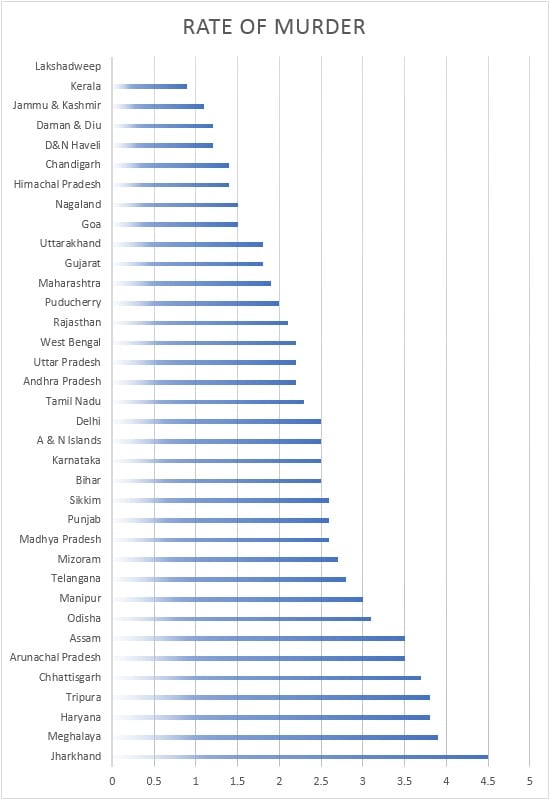
However, Table 4 presents a very disturbing situation. When we examine the percentage of political murders in the total number of murders happening in a state, Kerala suddenly tops the list. Only Uttar Pradesh, Bihar and Kerala were taken in this table, because these states had highest number of political murders in gross figures. All other states have very less number of political murders to be statistically significant.
Table 4
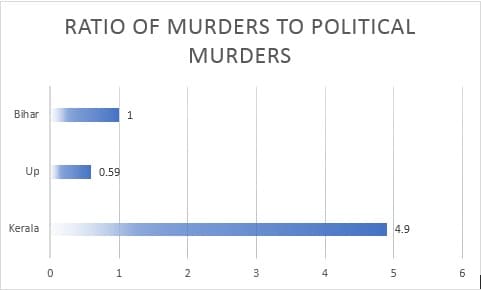
Data in Table 4 yields the result that the rate of political murder in Kerala is eight times more than Uttar Pradesh and five times more than Bihar.
The state machinery is effective and works very efficiently in curbing the crime of murder is established and proved by the figures of Table 2 and 3, but it doesn’t seem to work at all when it comes to curbing political murders. In fact, suddenly, the state starts faring much worse than even Uttar Pradesh and Bihar and the worst in the country.
This leads to the inevitable conclusion that the state machinery is deliberately not trying to work against political murders. The political will is clearly not there to curb such crimes.
Otherwise, nothing explains the otherwise effective state machinery not being able to clamp down upon the series of political murders happening in the state. As the data indicates, no one but the political parties ruling the state can be held responsible for the lawlessness.
This again makes the case for a President’s Rule in the state, when the state government itself has no desire or probably is complicit in the series of political murders happening in the state, once known as God’s own country.
Raghav Pandey is a Research Fellow with the Department of Humanities and Social Sciences, IIT Bombay, Mumbai. He can be reached at raghav10089@gmail.com, Twitter: @raghavwrong
Published Date: Jan 23, 2018 15:08 PM | Updated Date: Jan 23, 2018 15:11 PM







